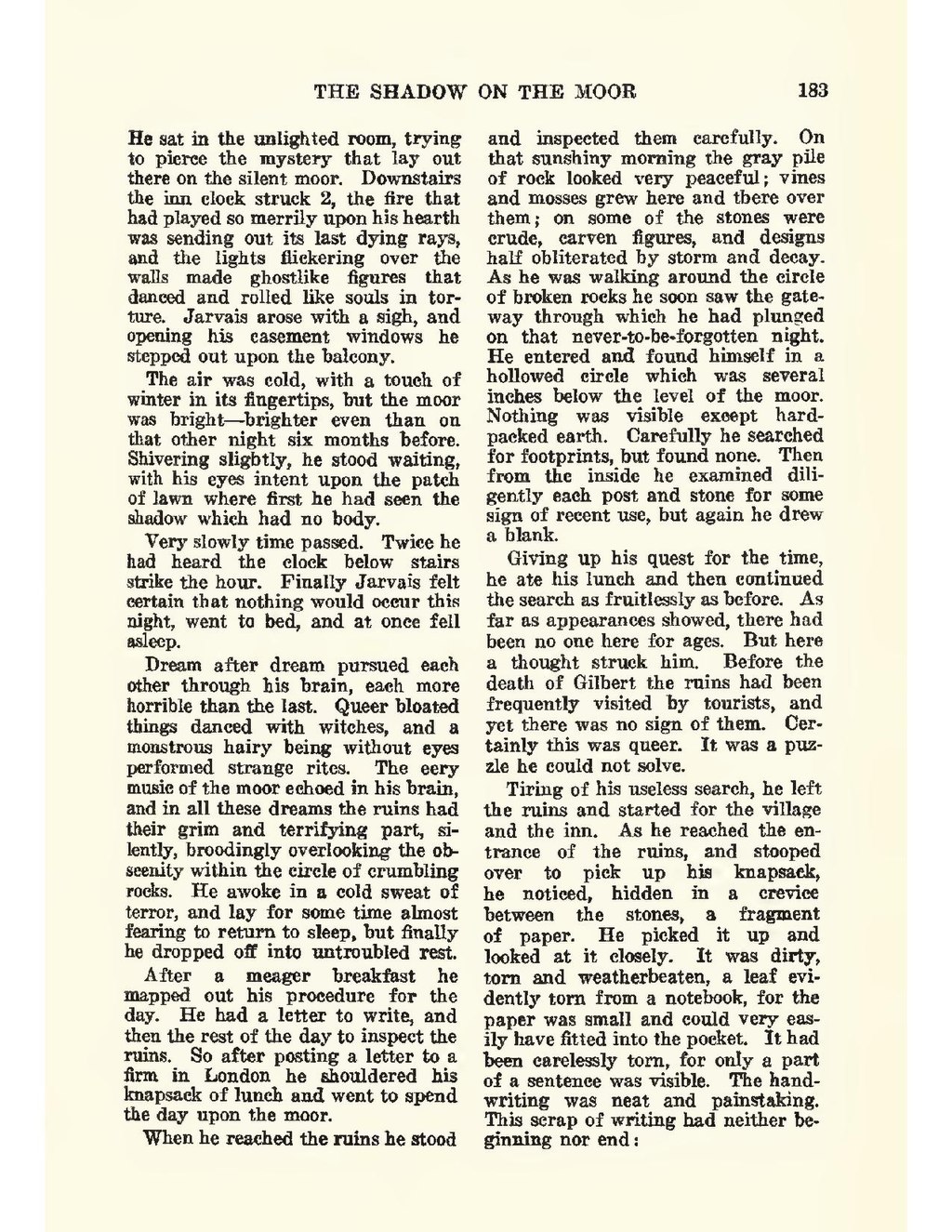He sat in the unlighted room, trying to pierce the mystery that lay out there on the silent moor. Downstairs the inn clock struck 2, the fire that had played so merrily upon his hearth was sending out its last dying rays, and the lights flickering over Hie walls made ghostlike figures that danced and rolled like souls in torture. Jarvais arose with a sigh, and opening his casement windows he stepped out upon the balcony.
The air was cold, with a touch of winter in its fingertips, but the moor was bright—brighter even than on that other night six months before. Shivering slightly, he stood waiting, with his eyes intent upon the patch of lawn where first he had seen the shadow which had no body.
Very slowly time passed. Twice he had heard the clock below stairs strike the hour. Finally Jarvais felt certain that nothing would occur this night, went to bed, and at once fell asleep.
Dream after dream pursued each other through his brain, each more horrible than the last. Queer bloated things danced with witches, and a monstrous hairy being without eyes performed strange rites. The eery music of the moor echoed in his brain, and in all these dreams the ruins had their grim and terrifying part, silently, broodingly overlooking the obscenity within the circle of crumbling rocks. He awoke in a cold sweat of terror, and lay for some time almost fearing to return to sleep, but finally he dropped off into untroubled rest.
After a meager breakfast he mapped out his procedure for the day. He had a letter to write, and then the rest of the day to inspect the ruins. So after posting a letter to a firm in London he shouldered his knapsack of lunch and went to spend the day upon the moor.
When he reached the ruins he stood and inspected them carefully. On that sunshiny morning the gray pile of rock looked very peaceful; vines and mosses grew here and there over them; on some of the stones were crude, carven figures, and designs half obliterated by storm and decay. As he was walking around the circle of broken rocks he soon saw the gateway through which he had plunged on that never-to-be-forgotten night. He entered and found himself in a hollowed circle which was several inches below the level of the moor. Nothing was visible except hard-packed earth. Carefully he searched for footprints, but found none. Then from the inside he examined diligently each post and stone for some sign of recent use, but again he drew a blank.
Giving up his quest for the time, he ate his lunch and then continued the search as fruitlessly as before. As far as appearances showed, there had been no one here for ages. But here a thought struck him. Before the death of Gilbert the ruins had been frequently visited by tourists, and yet there was no sign of them. Certainly this was queer. It was a puzzle he could not solve.
Tiring of his useless search, he left the ruins and started for the village and the inn. As he reached the entrance of the ruins, and stooped over to pick up his knapsack, he noticed, hidden in a crevice between the stones, a fragment of paper. He picked it up and looked at it closely. It was dirty, torn and weather-beaten, a leaf evidently tom from a notebook, for the paper was small and could very easily have fitted into the pocket. It had been carelessly torn, for only a part of a sentence was visible. The handwriting was neat and painstaking. This scrap of writing had neither beginning nor end:
